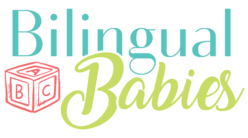Raising a child with more than one language is like a recipe for success! There are several advantages to being bilingual over being monolingual—beyond just being able to speak more than one language. Here are the main reasons why your child will have an edge!
1. Better cognitive abilities
Research suggests that there is a clear link between bilingualism and cognition. In different studies,  researchers found that children who speak multiple languages develop enhanced executive control, or the ability to effectively manage what are called “higher cognitive processes”. That means they tend to be better problem-solvers, have better memories, and more flexible minds.
researchers found that children who speak multiple languages develop enhanced executive control, or the ability to effectively manage what are called “higher cognitive processes”. That means they tend to be better problem-solvers, have better memories, and more flexible minds.
2. Better social skills
Good news for monolingual parents! Research found that children who are either speaking or regularly exposed to multiple languages develop better social skills. That means that you don’t even have to be bilingual yourself. Simply exposing your child on a consistent and regular basis to another language will provide her with that edge!
 Researchers at the University of Chicago did an experiment. They presented 4 to 6-year old children with different language backgrounds (monolingual, bilingual, and those who are only exposed to another language but don’t really speak it) with a situation in which the children had to consider someone else’s perspective to understand meaning. The children could see three toy cars: a small, a medium and a large one. Also, they could observe that the adult could only see the medium and the large car. So when the adult asked if they could move the small car, bilingual and “exposure” children would more often reach for the medium-sized car than monolingual children. They understood that the medium-sized car must be the one the adult was referring to given that the adult could not see the smallest of the three cars.
Researchers at the University of Chicago did an experiment. They presented 4 to 6-year old children with different language backgrounds (monolingual, bilingual, and those who are only exposed to another language but don’t really speak it) with a situation in which the children had to consider someone else’s perspective to understand meaning. The children could see three toy cars: a small, a medium and a large one. Also, they could observe that the adult could only see the medium and the large car. So when the adult asked if they could move the small car, bilingual and “exposure” children would more often reach for the medium-sized car than monolingual children. They understood that the medium-sized car must be the one the adult was referring to given that the adult could not see the smallest of the three cars.
The Chicago study was repeated with babies between 14 and 16 months who could see two bananas (the adult could only see one). Again: the same result. When asking the babies to hand them the banana, the bilingual and “exposure” babies reached more often for the banana that was visible to the adult. Monolingual babies reached equally often for either one of the two bananas.
If we think about it, this finding makes total sense. Bilingual children and those with regular exposure to another language grow up considering context and different perspectives. They constantly evaluate who speaks what language and where? Who can understand what content? They basically practice taking the viewpoint of others every day.
3. Delayed onset of dementia in comparison to monolinguals
 Researchers have found that bilinguals tend to develop dementia or Alzheimer’s disease on average 4-6 years later than monolinguals! While the rate or pace with which the disease progresses seems the same in both monolinguals and bilinguals, bilinguals developed dementia later in life than monolingual patients. For the entire study see here.
Researchers have found that bilinguals tend to develop dementia or Alzheimer’s disease on average 4-6 years later than monolinguals! While the rate or pace with which the disease progresses seems the same in both monolinguals and bilinguals, bilinguals developed dementia later in life than monolingual patients. For the entire study see here.
4. Better and broader communication skills
Your child will be able to communicate with people from different languages and cultures—an edge also when traveling. Reading a menu at a local restaurant in another country or talking to local people will make a traveling experience much richer. At times, it may also make it easier to navigate another country and culture.
 Beyond these more socially-oriented benefits, research has discovered some cognitive advantages in bilingual children such as better metalinguistic abilities. For example, this means bilingual children can determine better than monolingual children if a sentence is grammatically correct or not. Here is how we know about this:In several studies, researchers used so called “grammaticality judgment tasks” to understand differences between monolingual and bilingual children’s language awareness (how much the kids know about language). They asked children if a sentence was grammatically correct or not: “Tell me if the sentence is said the right way, even if the sentence is silly.” (Friesen & Bialystok, 2012). Following this instruction, the
Beyond these more socially-oriented benefits, research has discovered some cognitive advantages in bilingual children such as better metalinguistic abilities. For example, this means bilingual children can determine better than monolingual children if a sentence is grammatically correct or not. Here is how we know about this:In several studies, researchers used so called “grammaticality judgment tasks” to understand differences between monolingual and bilingual children’s language awareness (how much the kids know about language). They asked children if a sentence was grammatically correct or not: “Tell me if the sentence is said the right way, even if the sentence is silly.” (Friesen & Bialystok, 2012). Following this instruction, the
researchers asked the children to judge different sentences such as the following:
-
-
-
- “Apples grow on trees”,
- “Apples growed on trees.”
- “Apples grow on noses.”
-
In different studies that used this approach, researchers found that both monolingual and bilingual children were easily able to judge sentences like (1) and (2). However, when presented with (3), bilingual children did a better job indicating if the sentence was grammatically correct. By contrast, most monolingual children were not able to get past the silly and incorrect meaning of the sentence. They judged based on the meaning.In other words, bilingual children were capable of pushing the meaning of the silly sentence aside and focus on what was asked for: the grammaticality. This cognitive skill may not only help children to better learn additional languages in school, but it also highlights an additional benefit of being bilingual: an increased ability to focus.
-
5. Increased ability to focus
 The “executive control system” is a part of our brain that helps us focus. It allows us to focus on what is relevant and important in a certain situation, while helping to ignore all other distractions. For example, if you have two thoughts in your mind, the executive control system helps you to go back and forth between them. Now, with bilinguals, the system is active all the time because every time a bilingual uses language, both languages are activated and the system has to help decide which one is being used.
The “executive control system” is a part of our brain that helps us focus. It allows us to focus on what is relevant and important in a certain situation, while helping to ignore all other distractions. For example, if you have two thoughts in your mind, the executive control system helps you to go back and forth between them. Now, with bilinguals, the system is active all the time because every time a bilingual uses language, both languages are activated and the system has to help decide which one is being used.
In an interview, Ellen Bialystok, one of the most famous researchers in the area of bilingual education, put it as follows: “If you have two languages and you use them regularly, the way the brain’s networks work is that every time you speak, both languages pop up and the executive control system has to sort through everything and attend to what’s relevant in the moment. Therefore the bilinguals use that system more, and it’s that regular use that makes that system more efficient” (see A Conversation with Ellen Bialystok, 2011).
6. More job and career opportunities
 If you speak more languages you become a more valuable asset in today’s global job market. Not only can you get jobs in which you can immediately put your language skills to work (e.g., interpreting, teaching, etc), but many jobs today actually require applicants to speak more than one language. And it’s not only professions that are directly related to language. You basically need it in every job—whether you are working in tourism, education, medicine or engineering. If you can talk to more people in their languages, you can increase your value in any profession.
If you speak more languages you become a more valuable asset in today’s global job market. Not only can you get jobs in which you can immediately put your language skills to work (e.g., interpreting, teaching, etc), but many jobs today actually require applicants to speak more than one language. And it’s not only professions that are directly related to language. You basically need it in every job—whether you are working in tourism, education, medicine or engineering. If you can talk to more people in their languages, you can increase your value in any profession.
7. Easier to learn additional languages
There are similarities between some languages so you can draw on that knowledge when learning additional languages. Also, if you learned another language at school or as an adult, you have probably figured out which strategies  work best for you when learning a language. So you can transfer those strategies when learning another language. So things like potential similarities between languages and experience learning a language make us better equipped language learners.
work best for you when learning a language. So you can transfer those strategies when learning another language. So things like potential similarities between languages and experience learning a language make us better equipped language learners.
Overall, being bilingual and raising your child with multiples languages comes with a number of advantages and benefits! So even if it is a consistent work-in-progress, there is a heap of benefits that come with being bilingual—benefits we can give our children if we consistently expose them to different languages.
If you’ve made it all the way through the post: Thanks for reading!
Leave a comment if you’d like! Always appreciated!! 🙂
Sources & further reading:
The above seven points were informed by research—in particular the references below. For further reading see links! I would particularly recommend the interview with Ellen Bialystok!
For social reading:
- NY Times in Conversation with Ellen Bialystok (2011): The bilingual advantage
- Maria Konnikova (2015): Is bilingualism really and advantage?
- Katherine Kinzler (2016): The superior social skills of bilinguals
For science geeks:
- Bialystok, Craik, & Freedman (2007): Bilingualism as a protection against the onset of symptoms of dementia
- Fan, Liberman, Keysar, & Kinzler (2015): The Exposure Advantage: Early Exposure to a Multilingual Environment Promotes Effective Communication
- Friesen & Bialystok (2012): Metaliguistic ability in bilingual children: The role of executive control

1 comment
It’s great that you mentioned how you’ll have more job and career opportunities if you can speak more than 1 language. I grew up speaking two languages, and I want my daughter to be bilingual as well so it can help her in the future. I’ll have to look into admissions for dual immersion programs near us.